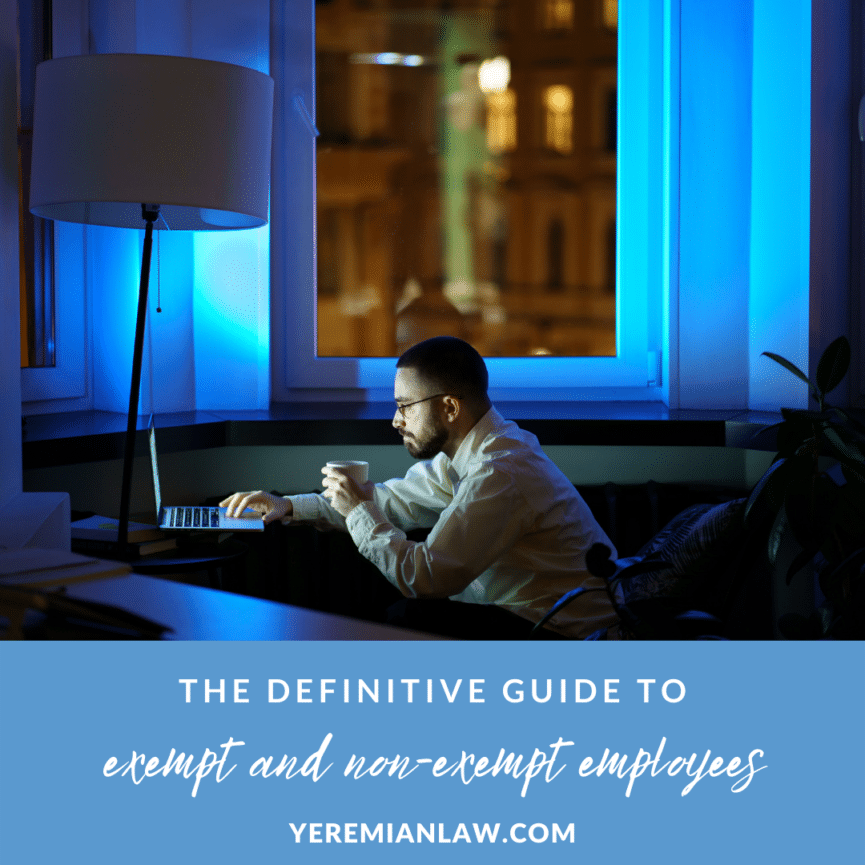If you’re like most people, you know some workers in California are exempt and some are nonexempt. But which one are you, and what do those two terms refer to? This guide explains whether you’re an exempt employee or you’re a nonexempt employee – and what the differences are between the two.
The Definitive Guide to Exempt Employees in California
Under the California Labor Code, there are two categories of employees: Those who are exempt from overtime protections and protections that other wage and hour laws provide, and those who are entitled to those protections.
Exempt employees are not entitled to protections under overtime laws or wage and hour laws. Nonexempt employees are entitled to those protections under the Labor Code.
Related: 7 common employment law issues
Categories of Exempt Employees
California law breaks down several categories of employees who are exempt from legal protections regarding overtime and other wage and hour issues. Those main categories include:
- Executive, administrative and professional employees. This is known as the white-collar exemption.
- Other exempt professionals: computer professionals, doctors and surgeons, private school teachers, government employees, employees of the University of California, and outside salespeople.
- Employees earning commissions, provided the commissions meet certain minimum criteria.
The Executive, Administrative and Professional Employee Exemption
In order for an employee to fall into this category, they must:
- Have primary duties (according to the job description, not what they actually do at the employer’s request) that are executive, administrative or professional. Typically, that means at least half of the employee’s work time is committed to these types of tasks.
- Regularly and customarily exercise discretion and independent judgment at work.
- Earn a salary equivalent that’s at least two times the state minimum wage for a full-time, 40-hour workweek.
Related: Minimum wage disputes and unpaid overtime
What About Registered Nurses?
Registered nurses are generally nonexempt employees. That means they’re entitled to overtime pay and other wage and hour protections. However, some registered nurses are exempt – but only those whose primary duties are administrative or executive, and who meet the other criteria for the so-called white-collar exemption.
Related: California overtime laws for hourly nonexempt workers
The “Other Exempt Professionals” Exemption
Other exempt professionals include:
- Computer professionals who are primarily engaged in intellectual or creative work that requires them to use their own discretion and judgment. They must also be highly skilled in applying highly specialized knowledge to computer systems analysis, programming or software engineering. The employee must also earn more than a certain amount (which is subject to change).
- Surgeons and doctors whose primary job duties require them to be licensed. These surgeons and doctors must also earn more than a certain amount, and that amount is subject to change.
- Private school teachers who are primarily engaged in teaching students and who regularly and customarily use their own discretion and independent judgment. These teachers must hold a bachelor’s degree or higher for an accredited university of have valid teaching credentials. These teachers must, like surgeons, doctors and computer professionals, earn more than a certain amount of money.
- Government employees and employees of the University of California. There are no additional conditions.
- Outside salespeople who meet certain criteria.
The Exemption for Employees Earning Commissions
Employees who earn more than 1.5 times minimum wage and earn more than half of their pay through commissions are also exempt. That’s California minimum wage – not federal minimum wage.
What, Exactly, Are People Exempt From?
Exempt employees are exempt from California’s overtime laws. That means that their employers do not have to pay them overtime wages for working more than full-time.
On the other side of the coin, nonexempt employees are entitled to overtime pay if they work more than eight hours in one workday or more than 40 hours in one workweek. There are other situations in which employees are entitled to overtime pay, as well.
What Can You Do if Your Employer Misclassifies You As Exempt?
If your employer calls you an exempt employee and doesn’t pay you for overtime, even if you’re entitled to it, you may have legal recourse. Call our office at 818-230-8380 or fill out the form below to set up a confidential consultation with an experienced professional – we’ll give you the guidance you need.




